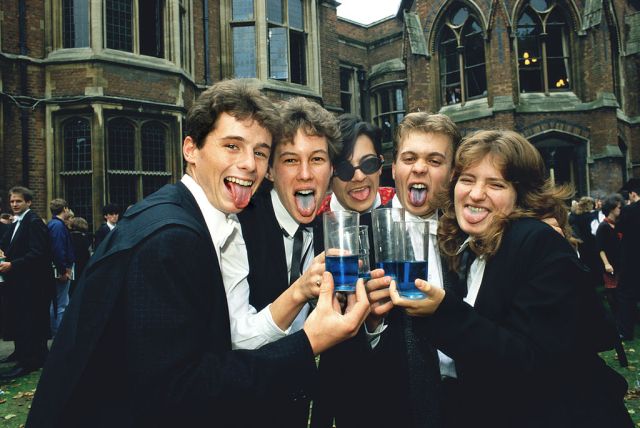Claustrophobic colleges breed discontent. (Credit:Tom Stoddart/Getty Images)

Oxford colleges are suffocating places, stuffed to the gunnels with competitive and perfectionistic types, precocious in some ways and very immature in others. Everybody knows everybody else, adolescent hysteria and gossip can travel fast, and an atmosphere dominated by a few loud personalities can feel extremely claustrophobic. In this respect, smaller colleges are probably the worst.
I learnt this lesson the hard way. Early on during my time at Oxford, after an alcohol-fuelled encounter during Freshers Week, I descended gingerly into the quad the next morning. On a noticeboard at the college entrance where people would usually read official missives about exams or prizes, some third year had stuck up a bit of A4 gloatingly informing fellow students, tutors, and passing tourists of my liaison. Beneath such a weirdly personal prank, darker emotions were presumably lurking, but 19-year-old me was incapable of analysis, conscious only of burning shame.
I remembered this feeling reading about the death of the 20-year-old Oxford student Alexander Rogers, who killed himself within a week of being shamed by university friends. According to the coroner, he too had become the subject of rumours after a post-pub tryst. While no formal allegation was registered, the woman involved told mutuals afterwards that it had left her feeling “uncomfortable”. An ex-boyfriend of hers was then involved in a physical confrontation with Rogers, while others told him he had “messed up” and they would be distancing themselves accordingly. Shortly afterwards, the third-year material sciences student wrote a goodbye note describing an “unintentional but unforgiveable” act.
It’s usually an oversimplification to assume a suicide is caused by a single precipitating event. Still, the coroner in this case at least seemed to think that the social punishment exacted immediately beforehand played a substantial role. He cited an independent review commissioned by Corpus Christi — the college attended by Rogers — describing a “normalised” culture in which “students could rush to judgment without knowledge of all the facts, could shun those accused, and a ‘pile-on’ might occur where a group would form a negative view about another individual”. According to the report, “this culture was not limited to Oxford University — it is an issue for the higher education sector as a whole.”
When I was an undergraduate, it was the Nineties, and the balance of social power was still mostly in males’ favour, especially if they came from public schools. The kings of the castle were the “rugger buggers”: braying beer monsters who would get their kit off in the bar or race naked around the quad at a moment’s notice — only apparently to impress each other — and who tended to treat members of the opposite sex like confusing and slightly distasteful alien species. There was lots of open mockery and cruel nicknames for certain collectively designated stooges. Those who didn’t positively join in tended to watch with the flat indifference of late youth, strategically incurious about whatever the victims must be feeling inside.
And then there was the Junior Common Room (JCR) meeting every Sunday, to which most Freshers in my day would dutifully troop. A venerable college tradition had it that each week a comic speech would be given by a second year — almost always male — roasting flamboyant college characters old and new in the crudest of terms, and detailing any intrigue that had taken place over the past seven days. There were only a handful of women in my intake, and female vocal tics, surnames, fashion choices, and doomed attempts to find boyfriends were the butt of many jokes. I would laugh as hard as anyone there and ignore the mortified faces beside me, glad that this time it wasn’t me.
These days, a brief perusal of online resources for undergraduates suggests things have changed quite a bit. Guilt at the relative privilege of most Oxbridge students has apparently been supercharged by powerful ideological forces that were rippling across the country anyway, and now every college seems to resemble a rest home for the nervously exhausted in some kind of expiation.
At my old college, for instance, there are weekly “Welfare Teas”, “peer supporters” and “college parents”. There’s a BAME officer, an LGBTQ+ Officer, a “Womxn’s Officer”, and two “Class Officers… for anyone who identifies with class issues”. There’s also a JCR “gender expression fund… for anything to do with your gender expression, from binders, packets and the like to haircuts, clothes and makeup”. One assumes it doesn’t stretch to manly sporting attire for archaic souls whose gender identity is rugger bugger.
Meanwhile, the college’s “Flag Flying Policy” reveals a confused jumble of ancient and modern colours and causes: the Union Flag for the sovereign’s birthday and Remembrance Sunday; the college flag for Eights Week; the Progress Flag for Pride Month, and the Trans Flag for Trans Awareness Week. One can only imagine the impassioned internal battles to get the Palestinian flag up.

This would all look quite innocent — and indeed, endearingly solicitous and idealistic from some angles — if you didn’t suspect that more traditional human emotions also have to find an outlet. This week, the papers have shared first-hand accounts from Oxbridge students, bearing witness to painful struggle sessions and acts of shunning for those suspected of harbouring morally injurious attitudes. And this fits with what others have told me: a Cambridge student I met in 2023 who said her entire college year group had turned on her after she was discovered to have written a mildly gender-critical blog post; an Oxford student who told me she had defended me against accusations of “transphobia”, and was excommunicated by her peer group as a result.
It’s tempting to rail against the fanaticism of aspiring young witchfinders, and the cowardice of those who fall in silently behind them, especially when the consequences are as grave as in Alexander Rogers’ case. But just as I now look back on the sometimes parodically boorish student behaviour of the Nineties as exacerbated by the wider “lad” culture, glorified at the time in magazines and on telly, so, too, it seems clear that the whispering and pointing now rife among students would not be so popular had influential adults not sanctioned it. In many ways, here too young people are just doing what they think they are supposed to, by diligently copying other people.
In particular, the current intake has lived through the group hysteria surrounding #MeToo at a formative age, a movement which started with good intentions but ended up as a trivial revenge project for unsatisfactory sexual encounters. Even as I write, there are women lost in their own projections, confidently opining online that Alexander Rogers must have done something illegal, despite no detailed knowledge about the case. This gamete-divided Manichaeism reigned uncontested in the progressive media for years. In 2020, for instance, a Guardian commentator was telling us with arresting confidence that “[f]or women… ‘bad sex’ almost always involves considerable pain and/or violence”. Any resulting damage to the psyches of boys and girls listening in was treated as negligibly important collateral.
Then, in the run up to university, present-day students will have participated in endless classroom discussions about things such as “toxic masculinity” and “white privilege”. Ironically, this seems to have been especially likely to be the case if they went to places like Eton. And now that they are finally on the home stretch in higher education, they are bound to encounter at least a few lecturers or tutors who delight in rooting out politically suspect language from young mouths and minds, and who approach every topic, no matter how abstract, with an eye to playing hunt-the-victim. That is still the case in every university I know.
Over the years, in other words, they will have learnt that — without having done anything deliberate to earn it — many of them carry a deep moral taint that requires constant vigilance in order to suppress it, and frequent acts of atonement. While public sympathy is rightly with Alexander and his family, please do spare a thought for the young friends of his who believed they were doing the right thing in confronting him. We raised them that way. And now they have to live with the consequences.
For confidential support, the Samaritans can be contacted by calling 116 123 or going to samaritans.org









